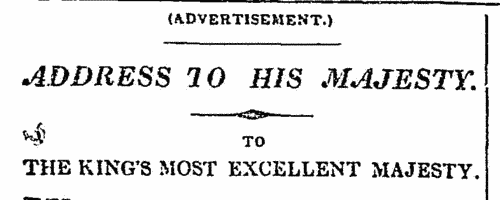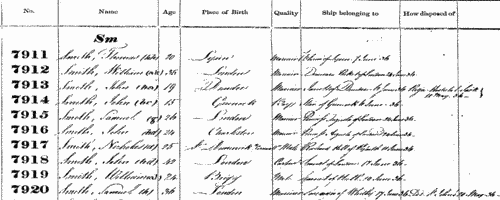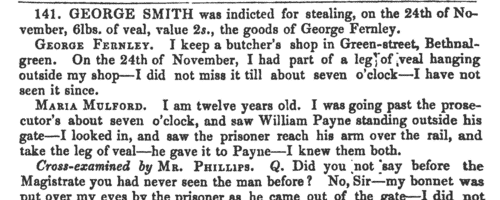Add this eBook to your basket to receive access to all 660 records. Our indexes include entries for the spelling franks. In the period you have requested, we have the following 660 records (displaying 271 to 280): These sample scans are from the original record. You will get scans of the full pages or articles where the surname you searched for has been found. Your web browser may prevent the sample windows from opening; in this case please change your browser settings to allow pop-up windows from this site. South County Durham Poll Book: Barnard Castle District
(1832)
A poll for two Knights of the Shire to represent in Parliament the Southern Division of the county palatine of Durham was taken on 21 and 22 December 1832. This poll book sets out all the electors by polling district (Barnard Castle, Bishop Auckland, Darlington, Middleton-in-Teesdale, Sedgefield, Stanhope and Stockton) and gives registered number; full name (surname first); place of abode; nature of qualification (such as House as occupier, Land as occupier, Copyhold Property, &c.); and the name of the parish, township or place where the property is situate. The votes are set out in the right-hand columns, under P. (for Joseph Pearse, jun., esq.), B. (John Bowes, esq.), and S. (Robert Duncombe Shafto, esq.), the three candidates. A voter could choose two candidates, in which case a dash is put in each of the two appropriate columns, or plump for just one - where a star is placed in that candidate's column. This was the first election after the Reform Act, which extended the franchise in the counties to all adult men possessing freehold worth 40s a year or more, or copyhold or long leasehold of £10 or more, or being tenants or short leaseholders of £50 or more. | Sample scan, click to enlarge

| Merchants, Bankers, Shipowners and Traders of London
(1834)
The public prints of December 1834 carried this loyal address to king William IV of merchants, bankers, shipowners, traders and others connected with the city of London, requesting 'permission at the present juncture to address your Majesty for the purpose of renewing the expression of our dutiful and loyal attachment to your Majesty’s person and crown. Deeply sensible of the practical blessings we have hitherto enjoyed under our wisely mixed constitution of King, Lords, and Commons, and feeling that the free and legitimate exercise of the Royal prerogative forms an integral part of that constitution (as essential to the maintenance of our own liberties as to the power and dignity of the Throne), we beg humbly to assure your Majesty of our determination steadfastly to uphold the same by every means in our power.
'Feeling, in common with all classes of your Majesty’s subjects, the deep importance of applying to all real abuses, wherever they may be found, a wholesome and timely correction, and of effecting in our excellent institutions every improvement of which careful examination and experience may prove them to be susceptible, we desire further dutifully to express our entire confidence that these useful purposes will ever occupy your Majesty’s paternal care. Nor can we permit ourselves to believe that the importance of these objects will be less apparent to those to whom the powers of government have been recently intrusted.'
Full names are given (or surname with initials), and address. Over 5000 subscribed.
| Sample scan, click to enlarge

| Insolvents
(1835)
Insolvency notices for England and Wales: insolvency often caused people to restart their lives elsewhere, so these are an important source for lost links | Sample scan, click to enlarge

| Irish Insolvents
(1835)
Insolvency notices for Ireland: insolvency often caused people to restart their lives elsewhere, so these are an important source for lost links, especially for emigrants | Sample scan, click to enlarge

| Poachers committed to prison at Southwell in Nottinghamshire
(1833-1836)
In response to a parliamentary enquiry, returns were made in early 1836 from each of the gaols in England and Wales of the number of commitments, prosecutions, convictions and sentences under the game laws since 1 November 1833. The returns varied in scope; most give the full name of each poacher, date, and sentence. The usual offence is that of 'poaching', i. e. being out armed in the night in pursuit of game; occasionally it was aggravated by assaulting a gamekeeper &c. | Sample scan, click to enlarge

|  British merchant seamen
(1835-1836) British merchant seamen
(1835-1836)
At this period, the foreign trade of ships plying to and from the British isles involved about 150,000 men on 15,000 ships; and the coasting trade about a quarter as many more. A large proportion of the seamen on these ships were British subjects, and so liable to be pressed for service in the Royal Navy; but there was no general register by which to identify them, so in 1835 parliament passed a Merchant Seamen's Registration Bill. Under this act this large register of British seamen was compiled, based on ships' crew lists gathered in British and Irish ports, and passed up to the registry in London. Each seaman was assigned a number, and the names were arranged in the register by first two letters of the surname (our sample scan shows one of the pages for 'Sm'); in addition, an attempt was made to separate out namesakes by giving the first instance of a name (a), the second (b), and so on. But no effective method was devised to prevent the same man being registered twice as he appeared in a second crew list; moreover, the original crew lists were clearly difficult for the registry clerks to copy, and some of the surname spellings appear to be corrupted. A parliamentary committee decided that the system devised did not answer the original problem, and this register was abandoned after less than two years: but it is an apparently comprehensive source for British merchant seamen in 1835 to 1836. The register records the number assigned to each man; his name; age; birthplace; quality (master, captain, mate, 2nd mate, mariner, seaman, fisherman, cook, carpenter, boy &c.); and the name and home port of his ship, with the date of the crew list (usually at the end of a voyage). Most of the men recorded were born in the British Isles, but not all (for instance, Charleston and Stockholm appear in the sample scan). The final column 'How disposed of' is rarely used, and indicates those instances where a man died, was discharged, or deserted his ship during the voyage. | Sample scan, click to enlarge

| Deaths, Marriages, News and Promotions
(1836)
Death notices and obituaries, marriage and birth notices, civil and military promotions, clerical preferments and domestic occurrences, as reported in the Gentleman's Magazine. Mostly from England and Wales, but items from Ireland, Scotland and abroad.
| Sample scan, click to enlarge

| Dissolutions of Partnerships
(1836)
Trade partnerships dissolved, or the removal of one partner from a partnership of several traders, in England and Wales
| Sample scan, click to enlarge

| Kent crimes tried at the Central Criminal Court: the accused
(1836)
Henry Buckler copied in shorthand the proceedings of trials at the Central Criminal Court in London, and his transcripts were printed. This volume (iii), from 1836, covers sessions i to vi of the Copeland mayoralty of 1835 to 1836. The bulk of the cases were from London and Middlesex, with separate sections for Essex, Kent and Surrey, but, preceding all these, Capital Convictions. The names of the accused are annotated with an asterisk to show if they had previously been in custody; an obelisk indicates a known associate of bad characters. Most cases resulted in a guilty verdict, and a large proportion of these led to a sentence of transportation to Australia. This index covers the accused in the Kent cases of January 1836. | Sample scan, click to enlarge

| Staffordshire Inquests
(1836)
The accounts of expenses incurred by Henry Smith of Wolverhampton, Staffordshire coroner, list the full names of the deceased, the date and place of each inquest. January to December 1836 | Sample scan, click to enlarge

|
Research your ancestry, family history, genealogy and one-name study by direct access to original records and archives indexed by surname.
|












